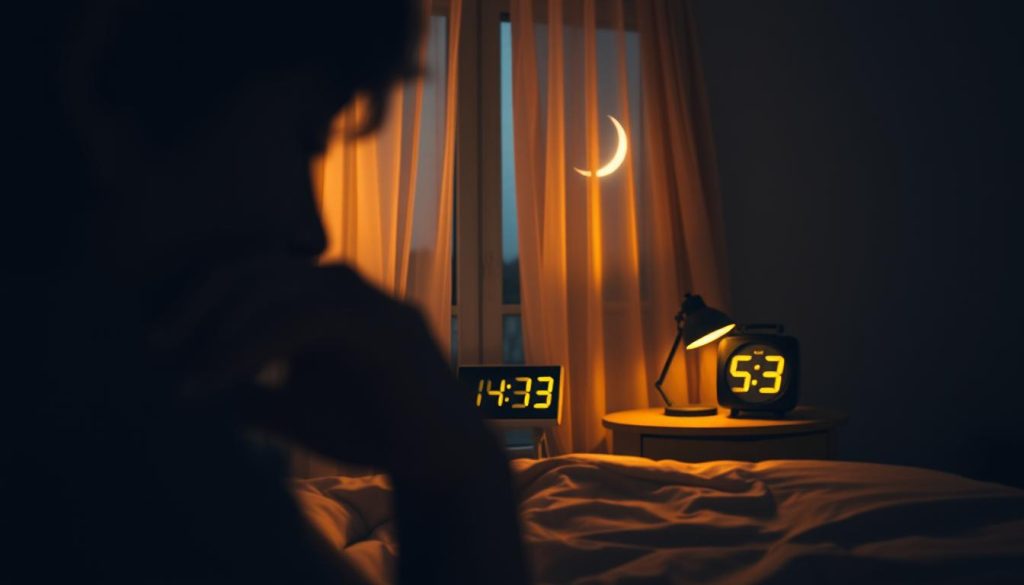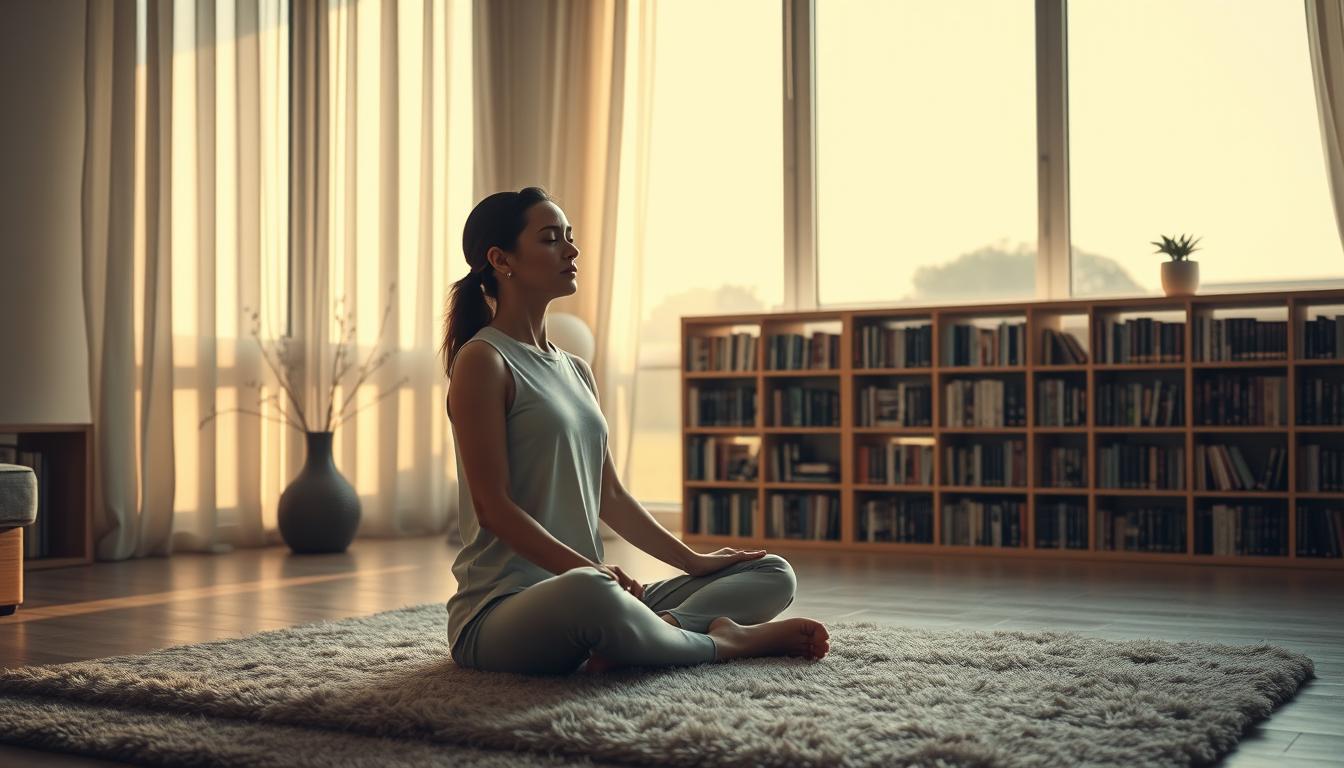Aging well is more than just looking good. It’s about feeling good too. Knowing about our biological clock and its role in our lives is key. As we get older, keeping our circadian rhythm healthy is vital. It helps keep our minds sharp, reduces aging signs, and boosts our mood.
Recent studies show how important it is to keep our internal clocks in sync. This helps us sleep better, think clearer, and stay healthier. By understanding and caring for our body’s natural rhythm, we can age more gracefully and healthily.
Understanding the Circadian Rhythm
The circadian rhythm is like our body’s clock. It controls when we’re awake and when we sleep. It also affects our mood, energy, and how our body works.
Experts like Dr. Michael Rosbash and Dr. Jeffrey C. Hall have studied this clock. They found that light is key to keeping our rhythm in sync. Natural light tells our brain when to wake up or go to sleep. But, artificial light, like from screens, can mess with our rhythm.
Our genes also play a big part in our body’s clock. Genes like ‘PER’ and ‘CRY’ help keep our rhythm going. They decide if we’re morning people or night owls.
Knowing about our circadian rhythm is important for our health. Problems with our rhythm can cause mood issues, metabolic problems, and affect our brain. By living in sync with our natural rhythm, we can stay healthy and age better.
The Connection Between Circadian Rhythm and Aging
The circadian rhythm is key to our health and how long we live. It helps us stay healthy and feel good as we get older. Knowing about this connection is important for a happy and healthy life.
The Role of the Circadian Clock
The circadian clock is like our body’s internal clock. It helps our body’s activities stay in sync with a 24-hour day. It controls hormones, body temperature, and more, all important for aging well.
Research shows that a good circadian rhythm can help us live longer. It slows down aging.
Sleep-Wake Cycle and Aging
As we get older, our sleep patterns change. We might find it hard to fall asleep or stay asleep. This can lead to poor sleep quality and health problems like dementia and heart disease.
Keeping a stable circadian rhythm is key. It helps us sleep better and stay healthy as we age.

Impact on Overall Health
The circadian rhythm affects many health areas. It impacts our metabolism, immune system, and mental health. Studies show that a strong circadian rhythm can reduce aging’s negative effects.
By understanding the circadian rhythm and aging, we can make better choices. We can live a longer, healthier life by aligning our lifestyle with our body’s natural rhythms.
How the Biological Clock Changes with Age
As we get older, our biological clock goes through big changes. These changes, studied in chronobiology, show how time affects our body’s natural rhythms. Aging changes our chronobiological patterns, affecting our health and daily life.
Chronobiology and Aging Process
Chronobiological changes are a natural part of aging. Studies reveal that our aging biological clock shifts. This leads to changes in sleep, hormone levels, and metabolism.
These changes might make us go to bed and wake up earlier. It’s important to understand our natural circadian rhythms as we age.
Impact on Daily Routines
The evolving biological clock affects our daily routines a lot. Tasks we used to do easily might need adjustments. For example, older adults might find they’re more productive in the morning.
It’s key to recognize and respect these changes. This helps keep us productive and makes our daily schedules better.
Adapting to Changes
Adjusting to changes in our circadian rhythm is vital for aging well. We can do this by making lifestyle changes. For example, we should stick to a consistent sleep schedule and get natural light during the day.
We should also avoid light in the evenings. Eating well and staying active helps keep our circadian rhythm in balance. This can lessen the effects of an aging biological clock.
Health Effects of Disrupted Circadian Rhythm
A disrupted circadian rhythm affects overall health, especially in older adults. It’s important to know the health issues it causes. These include sleep disorders, metabolic problems, and mood swings.

Studies show a clear link between a disrupted circadian rhythm and sleep disorders. People with this issue often suffer from insomnia, sleep apnea, and restless leg syndrome. This leads to constant tiredness and lower productivity.
But the problems don’t stop there. A disrupted rhythm can also cause metabolic syndrome. This is a group of conditions like high blood pressure, high blood sugar, and excess body fat. These issues raise the risk of heart disease, stroke, and type 2 diabetes.
Mood swings are another issue. People with a disrupted rhythm often feel more anxious and depressed. This can affect their social and work lives, creating a cycle of stress and poor health.
| Health Issue | Effect of Disrupted Circadian Rhythm |
|---|---|
| Sleep Disorders | Insomnia, sleep apnea, restless leg syndrome |
| Metabolic Syndrome | Increased blood pressure, high blood sugar, excess body fat, abnormal cholesterol levels |
| Mood Fluctuations | Heightened anxiety, depression |
The Importance of Melatonin Production
Melatonin is key in controlling our sleep patterns. It tells our body when it’s time to sleep. Knowing how melatonin works can lead to better sleep and health.
Mechanism of Melatonin
Melatonin is made mainly in the pineal gland. It’s released when it gets dark. This tells our body it’s time to sleep.
But, light from screens can stop melatonin production. So, it’s important to limit screen time in the evening.
Impacts on Sleep Quality
Melatonin helps us fall asleep faster and sleep better. When melatonin is working right, we sleep deeper and wake up feeling refreshed. It also keeps our sleep cycle in sync.
Role in Aging
Melatonin is called the anti-aging hormone. It fights off aging by reducing oxidative stress. As we get older, melatonin levels drop, leading to sleep problems.
Increasing melatonin through diet or supplements can help. It supports healthy aging and better sleep.
Impact of Light Exposure on Circadian Rhythm
The circadian rhythm is key to our sleep and health. It’s greatly affected by light. Knowing how light, natural and artificial, impacts this balance is vital for good sleep.
Natural Light vs. Artificial Light
Natural sunlight is the best for our circadian rhythm. It tells our brain when to be awake and when to sleep. But, artificial light, like blue light from screens, can mess with this natural rhythm. This can cause sleep problems and disrupt our body’s clock.

Effects on Sleep Patterns
Light at the wrong time can mess up our sleep. Bright lights in the evening can make it hard to fall asleep. This can affect our daily life and health over time.
Strategies to Optimize Light Exposure
To keep a healthy circadian rhythm, we need to manage light well. Here are some tips:
- Get lots of natural light during the day, especially in the morning.
- Use dim lights and avoid screens before bed to reduce artificial light.
- Try light therapy boxes to mimic natural light, especially in darker months.
- Use blue light filters on devices to help sleep better.
By following these tips, you can improve your circadian rhythm and sleep. This leads to better health and well-being.
Adopting Healthy Sleep Practices for Aging Gracefully
Healthy sleep practices are key to aging well. A good sleep environment, regular sleep times, and relaxation techniques improve sleep and well-being.
Creating a Sleep-Conducive Environment
A restful bedroom is essential. Make sure it’s cool, dark, and quiet. A comfy mattress and pillows are crucial for quality sleep.
Use blackout curtains and a white noise machine to block out noise. A peaceful sleep space helps you sleep better and age healthier.
Consistency in Sleep-Wake Times
Consistency in sleep times is important. Going to bed and waking up at the same time every day helps your body’s clock. This improves your sleep patterns.
Having a bedtime routine, like reading or a warm bath, tells your body it’s time to sleep.
Relaxation Techniques
Adding relaxation to your bedtime routine helps sleep. Deep breathing, meditation, and progressive muscle relaxation reduce stress and prepare you for sleep. These methods calm your mind and help you fall asleep faster.
| Sleep Practice | Benefits |
|---|---|
| Creating a Sleep-Conducive Environment | Enhances sleep quality, reduces external disturbances, supports healthier aging |
| Consistency in Sleep-Wake Times | Regulates the body’s internal clock, improves sleep pattern regularity |
| Relaxation Techniques | Reduces stress, prepares the body for sleep, promotes a calm mind |
Diet and Nutrition’s Role in Circadian Rhythm
The circadian rhythm, our internal body clock, is deeply affected by what we eat. Understanding how meal timing and nutrition impact our health is key. This knowledge helps us improve our overall well-being.
Timing of Meals
Eating at the same times every day is crucial for a balanced body clock. Regular meals help keep energy and metabolism in check. Avoiding late-night snacks is important to keep sleep patterns healthy.
Nutritional Choices
Choosing the right foods is vital for circadian health. Foods like whole grains, lean proteins, fruits, and veggies are best. They help us stay alert during the day and rest well at night.
Supplements and Their Impact
Some supplements, like melatonin and magnesium, can help with sleep and body rhythm. But, always talk to a doctor before adding them to your diet. This ensures they’re right for you.
Benefits of Physical Activity on Circadian Rhythm
Regular physical activity can greatly improve your circadian rhythm, boosting your overall health. Knowing the best times and types of exercises is key. This helps you enjoy the many benefits of a balanced circadian rhythm.
Optimal Timing for Exercise
Exercising at the right time can make a big difference. Morning workouts can make you feel more alert and awake. On the other hand, working out in the late afternoon or early evening can improve your physical performance.
Aligning your exercise with your natural rhythm can lead to better sleep and more energy during the day. This balance is crucial for your well-being.
Types of Physical Activity
It’s important to mix up your workouts for a well-rounded routine. Aerobic activities like walking, running, and cycling are great for your heart. Strength training helps build muscle and strengthen bones.
Yoga and stretching can improve flexibility and reduce stress. The most important thing is to pick activities you enjoy. This way, you’ll stick with them and enjoy the benefits.
Long-term Benefits
Regular exercise offers many long-term benefits. It helps with weight management, reduces disease risk, and boosts mental health. Over time, it strengthens your circadian rhythm, leading to better sleep and longer life.
Seeing exercise as a daily habit is key to lasting health and happiness. It’s a way to invest in your well-being for years to come.
To show the benefits of timed exercise, here’s a comparison:
| Aspect | Morning Exercise | Evening Exercise |
|---|---|---|
| Alertness | Increases for the day | Not as effective* |
| Performance | Steady | Peaks during workout |
| Stress Reduction | Moderate | High |
| Sleep Quality | Improved | Significantly enhanced |
*Depends on individual’s habit and routine
Exercise close to bed time should be moderate to avoid hindering sleep
Mindfulness and Its Effects on Circadian Rhythms
Mindfulness can change how we manage our circadian rhythms. It helps reduce stress and promotes relaxation. This can improve sleep quality and overall well-being.
Stress Management
Mindfulness is key for managing stress. It helps our body’s circadian rhythm work right. Deep breathing and body scans calm the mind, helping our sleep-wake cycle stabilize.
Benefits of Meditation
Meditation is great for syncing our circadian rhythm. It reduces stress and improves sleep. Meditation quiets the mind, making it easier for our natural rhythms to work.
Mindfulness Practices for Better Sleep
Adding mindfulness to our daily life can improve sleep. Techniques like progressive muscle relaxation and mindful breathing help. They promote relaxation and better alignment with our circadian rhythm.
Personal Stories: Aging Gracefully with a Balanced Circadian Rhythm
Many people have found ways to age well by balancing their circadian rhythms. Carla Simmons is one such person. She had trouble sleeping until she found a way to sync her life with her body’s natural clock.
Carla started using light in her daily routine and practiced mindfulness. These changes helped her sleep better and feel more alive.
Mark Gonzalez also made changes to improve his sleep. He started meditating in the evening and walking in the morning. These habits helped him sleep better and feel happier.
Mark’s story shows how important it is to keep our body clocks in sync. By following similar steps, we can all live healthier and happier lives. These stories are a reminder to make changes for a better life.

